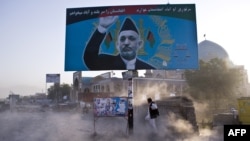Allegations of electoral fraud in June’s presidential runoff have forced Afghanistan to the brink of political crisis.
Despite recent reports that presidential hopefuls Abdullah Abdullah and Ashraf Ghani will negotiate a solution to the current impasse, the country’s social and political atmosphere is increasingly tense as rumors of violence between the candidates' support bases begin to swirl.
Despite Afghan President Hamid Karzai’s assurances that his successor will assume office as scheduled on August 2, he has largely snubbed international calls to use the influence and power of his own office to quell the dispute.
On Wednesday, Afghanistan’s Independent Election Commission (IEC) said results from last month's poll will be delayed as ballots from the country's nearly 2,000 voting centers are reviewed in what many call a concession to Abdullah, the former foreign minister who claimed 45% of March's first-round vote and has since accused his opponent, IEC officials and Karzai of runoff vote-rigging.
While a recount might ease some tension, the mere necessity of having to conduct it weakens the election’s credibility on the whole. Recent comments by IEC chief Yousef Nooristani on the brief and mysterious departure of commission secretariat Ziaulhaq Amarkhail, along with his attempted explanation for inflated runoff vote tallies in the country's predominantly Pashtun eastern provinces, have only introduced more ambiguity than clarity.
Indeed, Nooristani's remarks only underscore the urgency for Karzai’s immediate intervention.
The reason is simple. Ordinary Afghans risked their lives to cast a vote for democracy, peace and a better country for their offspring. Yet politicians, the IEC and government officials failed to create the conditions for a fair, transparent and acceptable election whose results either candidate — win or lose — could accept.
If Karzai is true to his claim that he’s determined to oversee the first democratic, peaceful, fair and timely transfer of power in the country’s history, he should take the allegations of fraud seriously and avert further damage to the credibility of national institutions such as the IEC.
By seeking assistance of the United Nations and other international partners to investigate the allegations of massive fraud, Karzai would not only aid in separating the valid votes from the fraudulent ones, but undercut Mr. Abdullah's accusations of petty political gamesmanship.
President Karzai recently said his vision of a united Afghanistan, where countrymen of all ethnicities, political thought and faith live in peace, has largely been achieved. While a few high-profile events have spoken to that sense of unity — the jubilation that swept the country as its national soccer team claimed the 2013 South Asia football championship; the outpouring of compassion witnessed as Afghans from Helmand to Mazar-e-Sharif rushed to the aid the Badakhshan landslide victims — the current electoral gridlock is threatening these fragile gains.
Even after the Taliban severed the purple-inked fingers of elderly men in an effort to intimidate voters and jeopardize the election, some of those brave men expressed a determination to return to the polls anyway, if only to cast a vote against extremism itself. If the IEC cannot uphold its mandate while candidates feud amongst themselves, it is incumbent upon the president to ensure the votes of normal citizens — some of whom paid for those votes with their own blood — weren't cast in vain.
Resolving this deadlock in a peaceful, electorally legitimate manner is not only the litmus test of Karzai’s presidential legacy, but the final moral obligation of his office as he prepares it for a successor.
It’s not about which candidate wins this election, but setting a precedent for elections to follow in the decades to come.
Sayed Zafar Hashemi is an Afghan journalist based Washington, D.C. The opinions expressed are those of the author alone and do not reflect those of Voice of America. Translation from the original Pashto edited by Pete Cobus.




